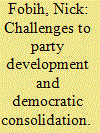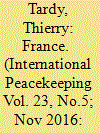| Srl | Item |
| 1 |
ID:
109127


|
|
|
|
|
| Publication |
2011.
|
| Summary/Abstract |
The second half of the twentieth century witnessed the emergence of the party system and democracy in African countries, for example Ghana, in the period preceding the postcolonial era. This article looks at some of the challenges facing Ghana's democratic consolidation and party development, and some of the institutional benchmarks required to help to promote effectively an accountable, participatory and democratic party system in the country in order to consolidate further its democracy. The study concludes with the view that regardless of their apparent weaknesses, political parties in Ghana are generally important institutions that grease the wheels of the country's democratic governance in the post-transition era.
|
|
|
|
|
|
|
|
|
|
|
|
|
|
|
|
| 2 |
ID:
149276


|
|
|
|
|
| Summary/Abstract |
French policy towards UN peacekeeping reflects the ambivalence of what France wants to achieve in the field of conflict management and through which institutional frameworks it prefers to work. On the one hand, France is greatly involved in the design and decision-making process of contemporary UN-led peacekeeping operations. On the other hand, after having been present in the field during the early 1990s, France underwent a major policy shift that led it to distance itself from UN operations. This chapter offers a narrative of French policy and perceptions vis-à-vis the virtues and limits of UN peacekeeping operations in the twenty-first century. It examines the French level of contributions, decision-making process, motivations and lessons learnt from past and current operations. It also analyses the dichotomy between the political role that France plays at the Security Council and its absence from UN-led operations. It seeks to determine how coherent this dichotomy is, its rationale, and how likely – and under what conditions – it will change in the near future, in particular through a hypothetical French return to UN-led peacekeeping operations.
|
|
|
|
|
|
|
|
|
|
|
|
|
|
|
|